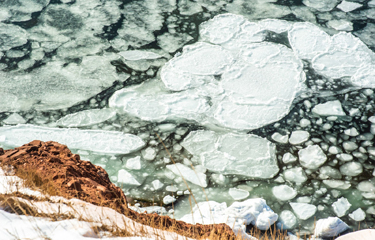Human-driven climate change has made the oceans hotter and more acidic, depleting them of oxygen and kneecapping their ability to produce life – a trend that will only continue if greenhouse gas emissions keep rising.
A comprehensive new report from the United Nations says that the entire marine food web and the fisheries that depend on it are threatened by climate change, and the only way to limit the severity of the disruption is by dramatically cutting greenhouse gas emissions. The costs and risks of delaying action are escalating.
The report from the Intergovernmental Panel on Climate Change (IPCC) was released on 25 September and focused on the impacts of climate change on the oceans and the cryosphere – the frozen parts of the planet. In the report, more than 100 authors from 36 countries assessed the latest science on the ocean, climate change and the cryosphere, referencing roughly 7,000 scientific publications.
The consequences of climate change are already apparent, and will grow more severe if humanity doesn’t take action soon, the report says.
“The world’s ocean and cryosphere have been ‘taking the heat’ from climate change for decades, and consequences for nature and humanity are sweeping and severe,” Ko Barrett, vice-chair of the IPCC, said in a statement.
So far, the oceans have absorbed 90 percent of the excess heat in the climate system, a pattern that is expected to continue unabated, and even rise. Warmer waters result in less mixing between water layers, reducing the supply of oxygen and nutrients for marine life.
In addition, between 20 percent and 30 percent of the human-caused carbon dioxide emissions released since the 1980s have been taken up in the oceans, leading to ocean acidification, which hampers the ability of shellfish and corals to grow.
Fisheries around the world will have to deal with the consequences of shifting stocks and lower overall ocean productivity, even as the exact ramifications vary from region to region. The Marine Stewardship Council is urging governments and the fishing industry to consider the effect of climate change on fisheries.
In the U.S., fishermen are concerned about the changes they’re already seeing on the water.
“Fishermen around the country are feeling the impacts of climate change – whether it's weathering a hurricane that decimates fishing infrastructure and coastal communities, or watching fish species traditionally found in fishing grounds migrate to find cooler water, or having catches reduced as a result of drastic reductions in available biomass due to changes in ocean temperatures,” Leigh Habegger, the executive director of Seafood Harvesters of America, told SeafoodSource. “Changes are afoot in our oceans and fishermen are among the first to witness these changes and sound the alarm.”
In the Gulf of Maine, the U.S. West Coast, and Alaska, fishermen have felt the impacts of marine heat waves, which the IPCC report says have doubled since 1982 and will become 20 to 50 times more frequent in the decades to come, depending on whether humanity lowers greenhouse gas emissions. Last year in Alaska, officials reduced permitted cod catches by 80 percent to allow stocks to rebuild because of warm waters.
Even as polar regions face disruption, they could actually see an increase in fish as new species migrate to higher latitudes. Globally, however, the situation is dire, and catch potential is expected to decline. Tropical regions, which are home to some of the world’s poorest people and those who depend on fisheries for subsistence, will suffer most.
In the warm tropics, many species are already at the upper end of their temperature tolerance, meaning that any rise in temperature will affect them negatively. And when those species move to cooler waters, there are no other species to fill in behind them.
“A lot of stocks are going to move and that’s going to mean that the people in those areas are going to suffer. And these are some of the places that can least afford it,” Merrick Burden, director of resilient fisheries at Environmental Defense Fund, told SeafoodSource. “The places that will tend to do better are the wealthier countries and wealthier societies. It’s not a nice picture and I don’t think it strikes anyone as fair. Not at all.”
Better fisheries management, especially internationally, can help mitigate the worst effects of climate change, Burden said. Fish populations are no longer static, and fishery managers need to consider that when implementing management schemes.
But preventing the worst effects of climate change demands a global reduction of greenhouse gas emissions.
“Cutting greenhouse gas emissions will limit impacts on ocean ecosystems that provide us with food, support our health and shape our cultures,” Hans-Otto Pörtner, co-chair of IPCC Working Group II, said in a statement. “Reducing other pressures such as pollution will further help marine life deal with changes in their environment, while enabling a more resilient ocean … Policy frameworks, for example for fisheries management and marine-protected areas, offer opportunities for communities to adapt to changes and minimize risks for our livelihoods.”
Photo courtesy of Simon Ryder-Burbidge/Ecology Action Centre







